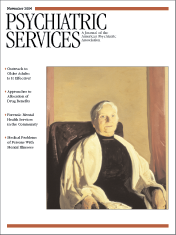To the Editor: Cotard's syndrome is a delusional disorder that was described by the French psychiatrist Jules Cotard in 1882. It is characterized by intense nihilistic delusion; the patient believes that his or her body has disintegrated or died. The syndrome is always associated with severe depression.
A 61-year-old female patient had been through multiple losses in her life—divorce and the death of both her father and her mother—and lived in a group home with limited social support. She was unable to cope with her emotions and her negative internal state. The patient was very depressed, isolating herself in a dark room, sleeping poorly, and having no appetite. She exhibited a delusion of being dead as an expression of psychic pain or a way of presenting a negative view to the world.
This patient was admitted to the hospital, where she was very depressed, isolating herself in her room, and neglecting her personal hygiene. She spent most of the time lying on her bed in a supine position, her body tightly wrapped with a bedsheet. She lacked vocal inflection and spontaneous facial expression. She denied perceptual disturbances, and she never expressed suicidal ideation, because she believed she had died seven years ago. She stated that her heart had stopped beating, her organs were not functioning, and food was not absorbed by her system.
After organic causes were ruled out (intracranial tumor and infection, thyroid disease, and nutritional deficiency), the patient was started on olanzapine at a dosage of 20 mg daily and escitalopram at a dosage of 10 mg daily for two months. She continued to be severely depressed and delusional. Electroconvulsive therapy was introduced; the patient received six treatments of bilateral electroconvulsive therapy over a period of two weeks, with a range of seizure duration of 43 to 52 seconds. After the second treatment, she stated, "I am alive." On subsequent treatment, she reported a significant decrease in depressive symptoms and stopped stating that she was dead.
At this time the patient was socializing with other patients and participating in therapeutic activities. She was able to sleep for six hours each night, finish 75 percent of her meals, and improve her personal hygiene. The patient was discharged on olanzapine at a dosage of 20 mg daily and escitalopram at a dosage of 10 mg daily. Until electroconvulsive therapy was introduced, the patient had not shown significant improvement in her depression and nihilistic delusion with a combination of antidepressant and antipsychotic medications.
Thus, with electroconvulsive therapy, this patient showed a substantial improvement of her symptoms and has been symptom free for one year since her last discharge.

